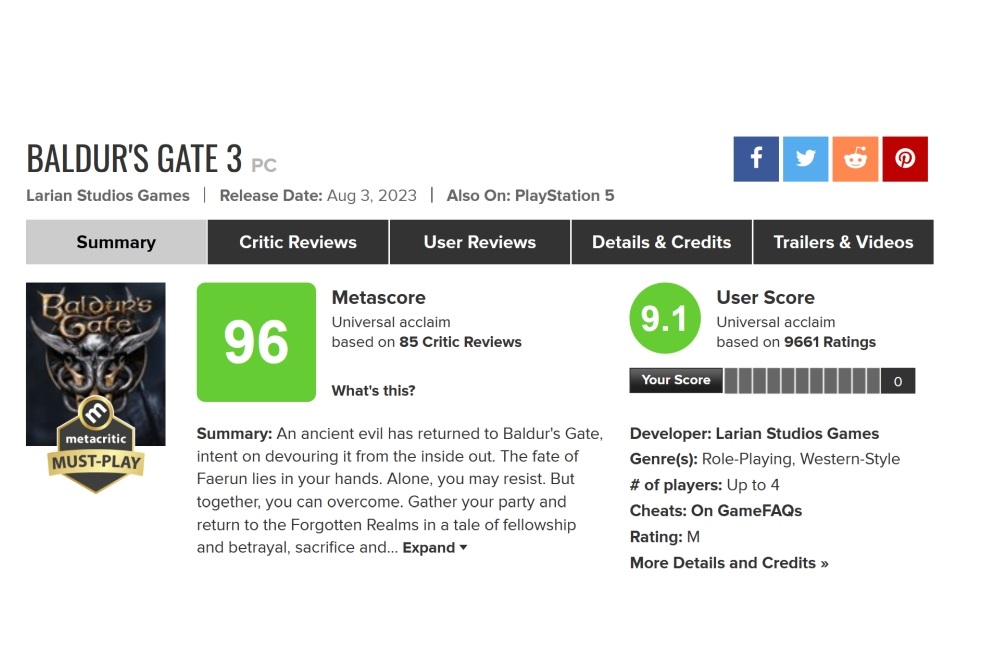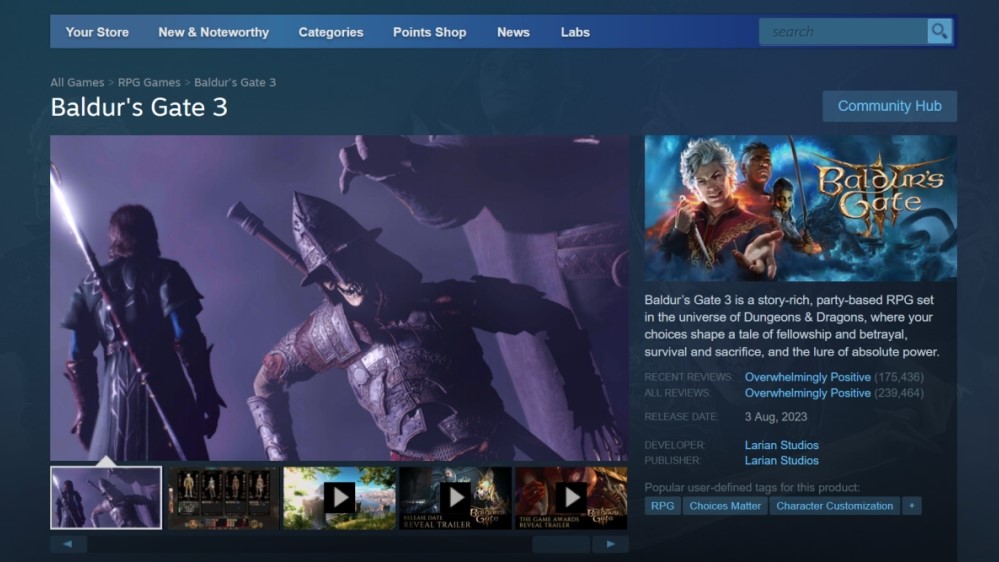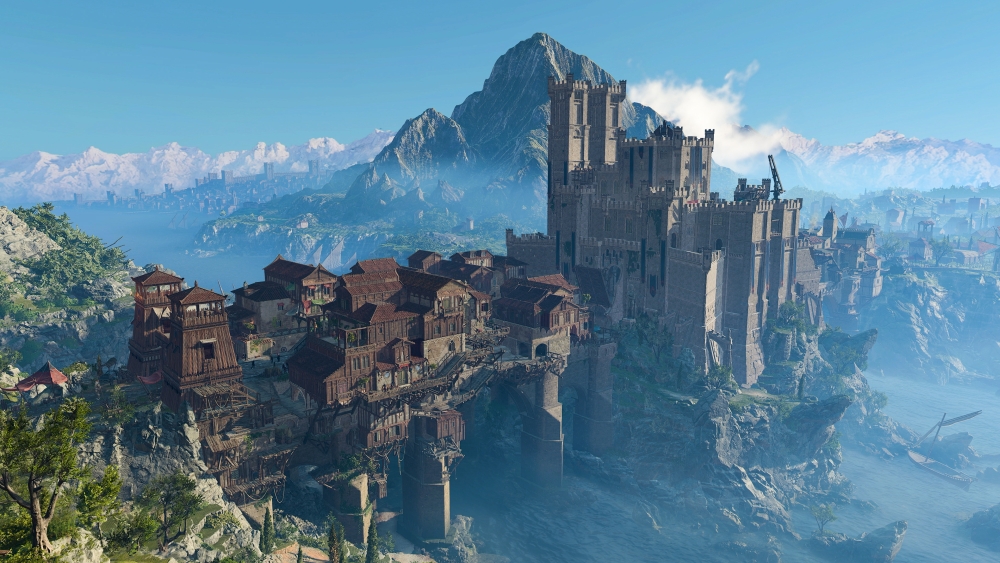
There has been a lot of discussion of Baldur’s Gate 3, and whether or not it should be the new standard to which all future RPGs are measured against. The whole discourse started with one thread on X (formerly Twitter) by another dev, cautioning against the unsustainability of devs creating only games of that scale. Naturally, the discourse is split between those who agree, and those who don’t, with both gamers and developers on both sides.
Context for those who are unaware, or have forgotten, Baldur’s Gate 3 released earlier this month to rave reviews. A game that’s beloved by critics and fans alike, and with no additional forms of payment required beyond the initial price of purchase. Even the previews of the game were already flooding the industry with hints that it would be great. But a month before it launched, the one developer in question posted what you see below, which sparked the whole “standards” discourse in video game development.
Like a lot of people, I'm deeply excited about what the lovely folks at Larian accomplished with Baldur's Gate 3, but I want to gently, pre-emptively push back against players taking that excitement and using it to apply criticism or a "raised standard" to RPGs going forward
1/10— Xalavier Nelson Jr. 🔜 PAX West (@WritNelson) July 8, 2023
I’ve spent the weeks since trying to put my thoughts together on the matter, while looking at what both sides have to say. There have been some insightful takes from both, as well as a handful of really daft ones. But either way, it’s safe to say that there’s a lot of nuance on the side of why Baldur’s Gate 3 is an anomaly rather than a standard. That being said, there’s equally a lot of misconstruing of the points on the opposing side that it almost feels deliberate.

In broad strokes, it should probably be fair to say that the arguments can be boiled down to a few points. The first is that it is very rare for a developer to have the resources that Larian Studios had while making Baldur’s Gate 3. This ranges from money and manpower to time, as well as anything else in between. Which is fair when discussing indie devs, as well as the dev teams of AAA publishers.
On the former, it should have been safe to say that no reasonable mind would expect a small indie dev team to have the resources to pull a Baldur’s Gate 3. But online trolling and ragebaiting culture makes it a lot harder to say so with certainty. As for the latter, while publishers may have the time and money to spend, these usually don’t translate to the dev teams, which are given only a fraction of what is actually available to work with.
A lot of folks had questions and concerns as a result of my earlier Baldur’s Gate 3 thread…
…So, I’m happy to keep talking about the really complex, interesting realities of megagame development today and clarify some points via video! 😁 pic.twitter.com/NKktawOGuV
— Xalavier Nelson Jr. 🔜 PAX West (@WritNelson) July 15, 2023
Next, when gamers say they want a game like Baldur’s Gate 3, it doesn’t necessarily mean that they want a game with the same graphical level, the same breath of content, as well as the same number of choices and consequences. While having all that in the same package would be nice, I would like to think that most gamers merely ask for a well-written game that is mechanically sound, with as little bugs as possible at launch. And if it’s meant to not be a live service game, then there shouldn’t be any recurring nickel-and-diming either.
For indies, plenty of concession can be made, even if the bar has been set pretty high by Disco Elysium. For AAA publishers, it does seem pretty unlikely, with the scale between product and profit being skewed so heavily to the latter side. Once again, devs under a big publisher umbrella may want to do great things, but they are limited to what their publishers assign to them, rather than what is actually available.
Oh boy… here comes my usual🌶️take:
I can't disagree with this one more. Whenever a game disrupts the industry and delights players beyond expectations, it absolutely raise industry and genre standards regardless of the why and how. (1/4) https://t.co/P0dqDyHdG0
— Juno Blees (@JunoBlees) July 16, 2023
And the third, I would argue that no one realistically expects dev teams to only make “mega games”, with no smaller games in between. In this sense, the only outlier really is Rockstar Games, which Take-Two Interactive permits for some reason to only release two games per decade. And even this is a very recent change, as prior to GTA V, the studio has released games on a near-yearly basis, even if some of them are on a smaller scale.

In the same vein, no one expects devs to stray away from what they do best to chase the hottest trend around, even if that’s what publishers want. In the case of Baldur’s Gate 3, Larian Studios has a history of making RPGs anyway, and so them making another one on a much larger scale is not a particularly outrageous idea. In fact, one should be cautions whether a developer team does something out of their wheelhouse, whether it is their decision or the publisher above them (read: Anthem).

Which, finally, brings me to the point of the article. As you can see in the title of this article, there is the one most important bit of nuance when discussing most of the problems in many industries today, but especially the video game one. To explain it, let me direct you to a clip from an interview with the late Steve Jobs. The full interview is probably lost to time, but this specific segment – the relevant bit to today’s discussion – has plenty of reuploads on YouTube.
I discovered the clip via YouTuber The Act Man, in his own take on the matter. Granted, the video itself should be taken with some grain of salt, as it took place around the time of the public fallout between Jobs and John Scully, who was Apple CEO for a time. And Jobs himself has had episodes of disconnect with reality, especially the episode with the antenna reception of the iPhone 3G and iPhone 4. But beyond that – and direct callouts to PepsiCo – it’s a trend that explains the woes of the video game industry.

To use an analogy derived from the clip, Larian Studios is very lucky that its leader, Swen Vincke, is a product person. His passion for the games the studio makes is plain to see. There are a fair number of studio heads, be they independent or under a larger umbrella. From Software and its president Hidetaka Miyazaki is another recent and easy example, considering his work with the Soulsborne series and the recent Armored Core VI: Fires of Rubicon. While there has not been any comparable public display of his love for the games he has worked on, it’s fair to say that his work speak for themselves.
But unfortunately, only the complete opposite can be said about the bigger publishers like Activision Blizzard, EA, Ubisoft, Take-Two and the like. Picture for a moment, the decision makers of these giants playing any one of the games that they publish. What’s the likelihood of that happening? What are the chances any of them understand the mechanics in those games, the lore, or the characters? Probably not, but there will be no doubt when it comes to their ability to get customers to pay for something more than once. Making matters worse is that these are publicly traded companies, which increases the profit pressure.

And these people, the sales and marketing people, are the one calling the shots. They, who have no idea when it comes to making a good game, are the ones determining the amount of resources used in the process. That, then defines the reality of devs, the product people, who want to do great things, but are limited not by the resources that are available, but the resources allocated for their use.

It’s also worth noting that, while there have been other “mega games” before, as the original threat that sparked the discourse described it. And yet, it is strange that it’s something that has only happened now, and not when, say, GTA V or RDR2 came about. That latter one got some discussion about crunch culture going, but that was about it. Nothing else has changed since, and, unfortunately, nothing much will change for the forseeable future. And with Starfield just around the corner, this will discussion will definitely be making another pass.

So, as much as I would like to provide a fix for this situation, there really is none. At least, no easy or realistic ones. There’s no realistic way to, say, make Vince Zampella the EA CEO or chairman of the board out of nowhere.
And on that bombshell…
The post The Most Important Bit Of Nuance In The Baldur’s Gate 3 Standards Discourse appeared first on Lowyat.NET.
0 Commentaires